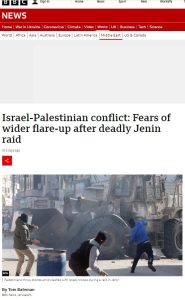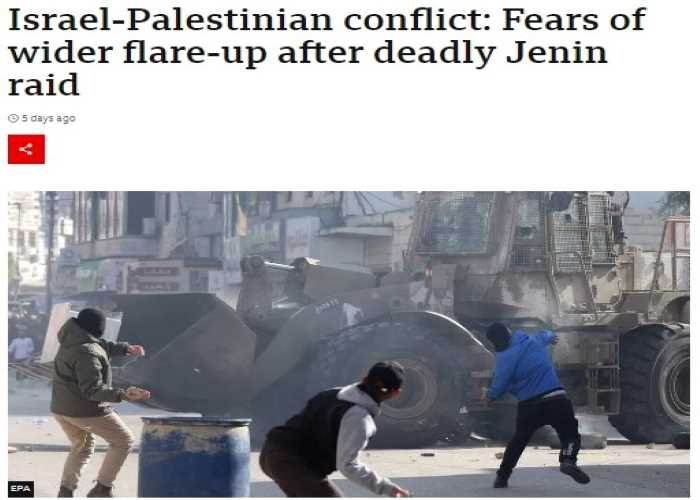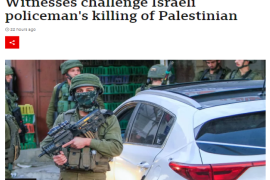Back in July 2022 we observed that a common feature of several BBC reports concerning Israeli counter-terrorism operations in the Jenin area was:
“…their failure to inform audiences on the topic of the formation of the ‘Jenin Battalion’ Joint Operations Room as reported last September.
Additionally – although unsurprisingly given the BBC’s chronic underreporting of internal Palestinian affairs – audiences have seen no serious coverage of the related topic of the Palestinian Authority’s loss of control over that part of Area A, where it is responsible for both civil affairs and security.”
We also noted that:
“On July 12th the BBC News website published a seven-minute filmed report by Tom Bateman titled ‘Jenin in the West Bank: Guns and grief on the rise’ which could have addressed those long-standing omissions but failed to adequately do so.”
Unfortunately for BBC audiences, the same omissions were repeatedly evident in subsequent content published over the next six months, along with a lack of reporting on issues such as the participation of members of the Palestinian Authority security forces and Fatah’s Al Aqsa Martyrs Brigades in terror attacks, Hamas efforts to fan the flames and undermine the Palestinian Authority and Hizballah and Iran’s funding and supply of weapons.
On January 26th the BBC News website published an article by the BBC Jerusalem bureau’s Tom Bateman titled ‘Israel-Palestinian conflict: Fears of wider flare-up after deadly Jenin raid’ in which he ostensibly addresses the background to the rise in terrorism over the past year and a half.
After a short portrayal of the counter-terrorism operation that had taken place in Jenin earlier in the day, Bateman tells readers that:
“The history matters here. I have been to Jenin repeatedly over the last year as Israel’s military raids have mounted, sparking increasingly fierce gunfights with a new generation of armed Palestinians.
Everyone you speak to roots their experiences in comparisons to April 2002, at the height of the second intifada or Palestinian uprising.
Back then, Israel launched a full-scale incursion – known as the Battle of Jenin – in which at least 52 Palestinian militants and civilians and 23 Israeli soldiers were killed. It had followed a campaign of Palestinian suicide bombings in Israel, many of which involved perpetrators from the city.
Much of Jenin camp was flattened in 2002. The scale of destruction, and Palestinians’ stories of trying to repel the forces, are part of the collective memory there. It forms a backdrop to much that has happened since.”
As was the case in Bateman’s December 2021 report on a jailbreak three months earlier (a video of which is embedded into this latest article), he fails to clarify that the majority of the Palestinians killed during the 2002 IDF operation in Jenin (which is still misrepresented by the BBC online over two decades later) were terrorists and gunmen. His claim that “much of the Jenin camp was flattened in 2002” also does not stand up to scrutiny and does not clarify that Palestinian terrorists booby trapped buildings in advance:
“…56 Palestinians were killed in the Jenin refugee camp, most of them armed men. Of the almost 2,000 homes in the camp, 130, several dozen of them bomb making factories, were destroyed.”
Later, Bateman relates to the PA’s loss of control over certain parts of the territory under its administration per the Oslo Accords.
“But there was something else going on which added more fuel, and explains why some fear a further security collapse in the West Bank.
The Palestinian Authority (PA), which has limited governance powers in Palestinian cities, was losing control of Jenin and Nablus.
The PA is important – a legacy of the 1990s Oslo peace process – but these days its ageing leadership is badly out of touch with the Palestinian street and is seen by many as little more than a security company for Israel’s occupation.
It is dominated by PA President Mahmoud Abbas’ Fatah party – bitter rivals of the Palestinian Islamist militants Hamas.
President Abbas now says security co-ordination will “end” due to the Jenin raid – although this threat has often been made before and only rarely even partially carried out.
By late 2021, the PA’s security forces were unwelcome in Jenin refugee camp and the Old City of Nablus. It was losing control.”
However, Bateman avoids mentioning the increased involvement of Fatah’s Al Aqsa Martyrs Brigades – as well as members of the PA security forces – in the escalating terrorism and violence and does not inform readers of the relevant topic of the ‘succession struggle’ that is already in evidence. The significant but serially avoided topic of PA sanctioned glorification of terrorism, incitement and financial support for perpetrators is of course absent from Bateman’s portrayal.
Bateman tells readers that:
“A new generation of militants in Jenin and Nablus were rejecting the PA while Hamas and Islamic Jihad militants faced arrest. They were arming themselves, loosely affiliated with the established groups but apparently not answerable to their traditional hierarchies.
They called themselves the Jenin Battalion and, in Nablus, the Lion’s Den. A grassroots following surged on TikTok and Telegram.
They appeared with American-made weapons smuggled from Jordan or stolen and sold on from IDF bases. Many were too young to remember the destruction of 2002 but were old enough to be inspired by stories from it.”
As we have documented, BBC audiences have been given next to no information about the Lion’s Den group since it emerged several months ago or about the previously established PIJ led Jenin Battalion which dates from 2021. Notably, Bateman avoids getting into the topic of the funding and supply of weapons to those groups, instead focusing readers’ attentions on their members’ alleged ‘inspirations’ rather than putting their activities into the broader context of regional terrorism.
Bateman’s ‘explanation’ of the rise in terrorism in Jenin also includes the following:
“From residents in Jenin refugee camp I repeatedly heard about the depressing reality continuing: by day, diminishing work prospects, the restrictions of a military occupation, no faith in a political future, and by night, the prospect of more Israeli military raids.”
However in a study of that topic published last June, the INSS noted that:
“In recent years, the Jenin area has enjoyed real prosperity, particularly the city of Jenin itself. The city’s economy has been based on the purchasing power of Arab Israeli citizens, who frequent the city and the region. Palestinian workers from the Jenin area have been employed in Israel, and the Jalameh Crossing has become institutionalized, with the volume of goods and number of people passing through growing consistently. The establishment of the Arab American University in Jenin, many of whose students are Israeli Arabs, has also accelerated the city’s economic development. Student dormitories were constructed around the city, and commerce in the surrounding new neighborhoods are oriented to the students who move there. The development of the city’s real estate and economy has been impressive, but the usual assumption that negatively correlates between improvement in the economic and employment situation and the motivation for terrorism has been proven wrong in the case of Jenin. Despite the economic prosperity, relatively high employment rates, and the close connection with Arabs from Israel and the Israeli economy, Jenin has remained an active breeding ground for terrorism. The resistance ethos continues to simmer, with terrorism being exported on a large scale with the city serving as a source of inspiration for other districts in the West Bank and beyond, including the Gaza Strip – thanks to Islamic Jihad’s prominent standing in Jenin and its affiliation with the organization in the Gaza Strip.”
As we see, Bateman’s ‘chicken and egg’ approach to the topic of terrorism in Jenin has not changed much since last July. His explanations of the fact that Jenin is a major hub of terrorist activity cite factors such as Israeli counter-terrorism operations (which of course come as a result of terrorist activity), a military operation from 21 years ago, political vacuum and economic worries in a place which was has been under Palestinian administration since 1996.
That framing is particularly relevant given Bateman’s closing paragraph:
“US Secretary of State Anthony Blinken arrives in Israel on Monday, with the country experiencing mass protests against the most nationalist government in its history. He says he wants to “preserve” the two-state solution – the long-held international formula for peace. The reality on the ground, along with the stated policy position of the new Israeli coalition, suggests he may as well be speaking another language.”
The missing link here is of course the fact that Hamas and the Palestinian Islamic Jihad (both of which are barely mentioned in Bateman’s article) have absolutely no interest in “the long-held international formula for peace”, do not accept the authority of the PA and its security forces and, particularly since Mahmoud Abbas’ cancellation of elections in early 2021, have been actively trying (with encouragement from Iran and Hizballah) to erode its standing and replace it.
As long as Bateman and his colleagues continue to avoid providing that bigger picture, BBC audiences will not be able to “engage fully” with this topic as “informed citizens”.
Related Articles:
BBC PROMOTES ‘CHICKEN AND EGG’ NARRATIVE ON JENIN
BBC NEWS STILL AVOIDING THE ISSUE OF LACK OF PA GOVERNANCE
BBC NEWS CONTINUES TO SKIRT THE BACKGROUND TO EVENTS IN JENIN
BBC’S BATEMAN DIGS UP OLD NARRATIVES IN GILBOA JAILBREAK REPORT
BBC FRAMING OF PALESTINIAN TERROR AND VIOLENCE CONTINUES TO FAIL AUDIENCES





